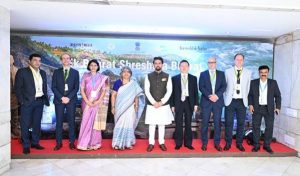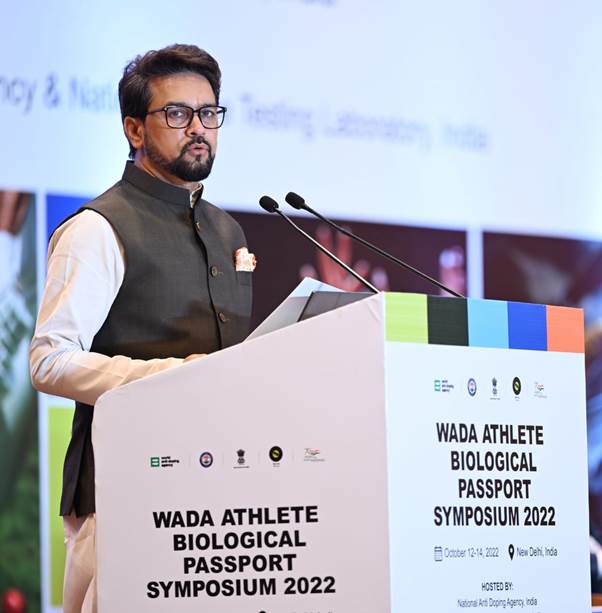 PIB Delhi – Union Minister for Youth Affairs & Sports Anurag Singh Thakur addressed the inaugural session of three days “WADA Athlete Biological Passport (ABP) Symposium- 2022” today in New Delhi. This symposium is being organised by National Anti-Doping Agency (NADA) and National Dope Testing Laboratory (NDTL). Secretary Sports Smt. Sujata Chaturvedi, DG National Anti-Doping Agency Ms. Ritu Sain, Associate Director (Athlete Biological Passport) World Anti-Doping Agency, Dr. Reid Aikin, Director of Asia / Oceania office World Anti-Doping Agency Mr. Kazugiro Hayashi and Senior Manager World Anti-Doping Agency Dr. Norbert Baume also graced the occasion. Speaking on the occasion Anurag Singh Thakur said that hosting the ABP Symposium for the first time in our history is more special for us as we are celebrating our 75th year of Indian independence as Azadi ka Amrit Mahotsav. Under the leadership of Prime Minister Narendra Modi, India is consistently achieving new heights in the global sporting landscape, he said.
PIB Delhi – Union Minister for Youth Affairs & Sports Anurag Singh Thakur addressed the inaugural session of three days “WADA Athlete Biological Passport (ABP) Symposium- 2022” today in New Delhi. This symposium is being organised by National Anti-Doping Agency (NADA) and National Dope Testing Laboratory (NDTL). Secretary Sports Smt. Sujata Chaturvedi, DG National Anti-Doping Agency Ms. Ritu Sain, Associate Director (Athlete Biological Passport) World Anti-Doping Agency, Dr. Reid Aikin, Director of Asia / Oceania office World Anti-Doping Agency Mr. Kazugiro Hayashi and Senior Manager World Anti-Doping Agency Dr. Norbert Baume also graced the occasion. Speaking on the occasion Anurag Singh Thakur said that hosting the ABP Symposium for the first time in our history is more special for us as we are celebrating our 75th year of Indian independence as Azadi ka Amrit Mahotsav. Under the leadership of Prime Minister Narendra Modi, India is consistently achieving new heights in the global sporting landscape, he said.

Thakur highlighted that Athlete Biological Passport is a very important scientific tool in anti-doping and the related research provides the world an opportunity to not only detect but deter doping in sports. He hoped that this Symposium turns out to be a big milestone in not only the evolution and bolstering up of ABP but also in our collective fight against doping. Union Minister urged all the participants to utilize this opportunity to equip ourselves with knowledge, tools, research and expertise that would empower us to protect our athletes and the entire sport ecosystem from the menace of doping. This symposium will enable us to strengthen the Anti-doping programme in India. Thakur informed that Government of India has recently enacted the anti-doping statute called the National Anti-Doping Act, 2022, which has been our long-standing goal as a mark of India’s unfaltering commitment to the global anti-doping movement. The Act is a manifestation of the Government of India’s strong resolve for clean sport at all levels in the country.
Thakur added that in the past one year, we have increased our contribution to World Anti-Doping Agency (WADA) and our contribution is 4th highest in Asia. We are also a major contributor to the Voluntary Fund of UNESCO. “To ensure that our athletes are protected from inadvertent doping due to consumption of nutritional supplements with prohibited substances, NADA is collaborating with National Forensic Sciences University (NFSU) and Food Safety Standards Authority of India (FSSAI)”, Union Minister added. Union Minister further informed that inclusive outreach content has been developed for athletes with disabilities. The sign language anti-doping education modules on Universal Design for Learning (UDL) principles are not only useful for athletes with disabilities in India but anywhere in the world. NADA India is sharing these resources with other NADOs in Asia. The main topics of discussion in this symposium will be recent trends, successes and challenges with the ABP, managing confounding Factor affecting the steroidal Module, evolving strategic testing for the ABP etc and will help WADA to work towards the detection and eradication doping in sports through APMUs. The first WADA ABP Symposium was hosted by the Anti-Doping Lab Qatar (ADLQ) in November 2015, in Doha, Qatar. The second WADA ABP Symposium was organized by the Italian Federation of Sports Medicine (FMSI) ain 2018, in Rome, Italy. This is the third WADA ABP Symposium and is being hosted in India for the first time. Two hundred plus participants from 56 Countries, WADA Officials, representatives and Experts from different National Anti-Doping Organizations, Athlete Passport Management Units (APMUs) and WADA Accredited Laboratories are participating in this Symposium.





